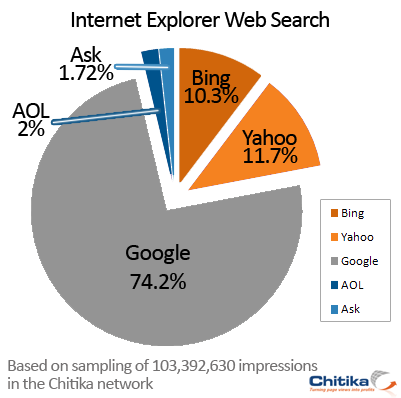
Back in the 1990s during the original browser wars between Netscape and Internet Explorer, one of Microsoft’s chief weapons was the ability to bundle IE into Windows as the default browser. With bundling came market share, or so the government argued in its antitrust case against Redmond.
Fast forward to today’s search wars. You’d think that bundling a search engine into a browser would have some impact on market share. But some new data provided by search advertising network Chitika suggests that at least for Bing, being bundled with IE isn’t doing it much good.
Chitika, which previously found that Bing searchers are cliack-happy, looked at more than 100 million search ad impressions across its network of 50,000 sites to determine which combination of browsers and search engines people are using. While Bing comes bundled with IE as the default search engine, only 10.3 percent of IE users search with Bing. This compares to 87 percent of Firefox users who search with Google and 92 percent of Safari users. Google is the default search engine for both browsers. It also commands 74 percent share on IE, suggesting that most people have no difficulty switching.
So bundling clearly isn’t giving Bing much of an advantage among IE users. The 10.3 percent share is only slightly above the 8.9 percent overall search share comScore measures for Bing in the U.S., which I mention only as a reference point. (These aren’t really comparable numbers since they come from two different studies, and the Chitika numbers include Canada as well as the U.S.). Well, at least the antitrust cops can’t bring up the old bundling argument again.
Update: Bing is only the default search engine the first time you download it. As with any browser, when you upgrade, your settings are transferred. Also, PC manufacturers make their won deals with search engines and can ship IE with whatever default search engine they want. Currently, Bing is the default search engine for Dell (worldwide), HP (U.S. and Canada) and Lenovo (worldwide) PC’s.